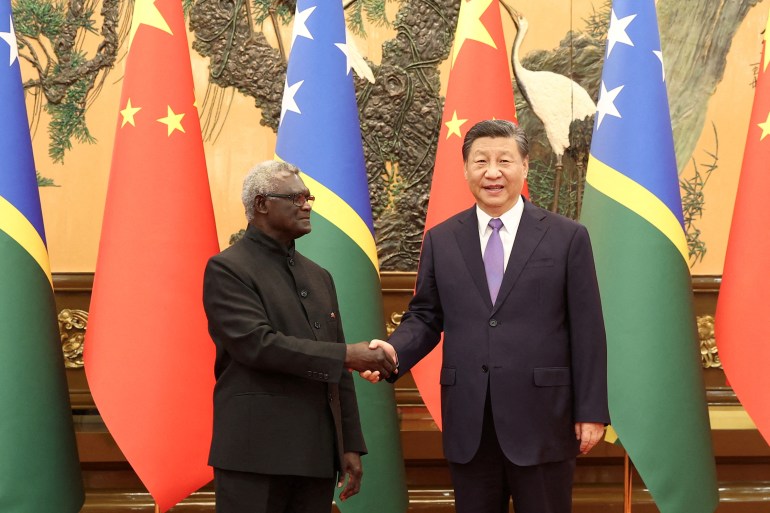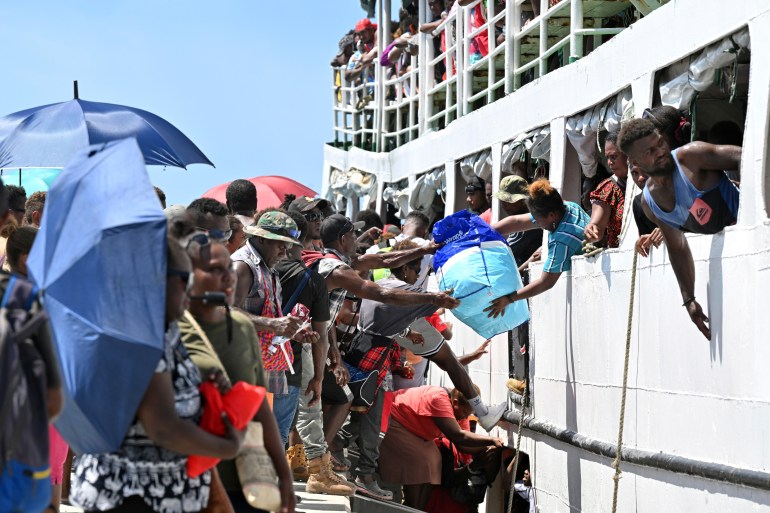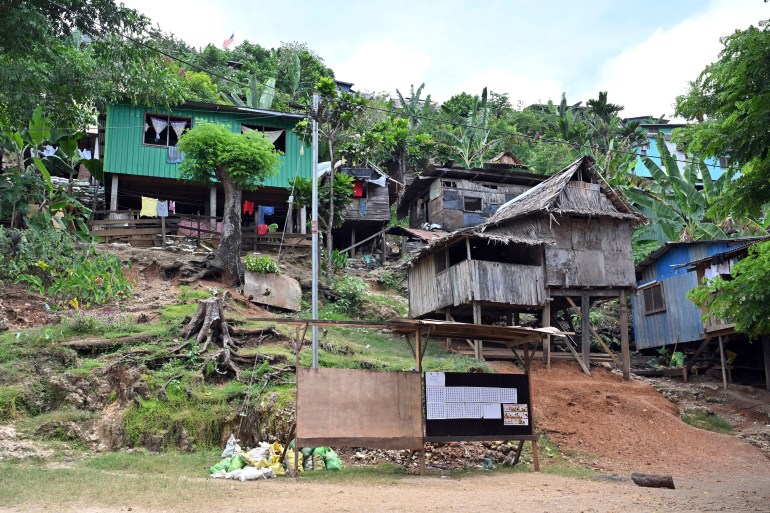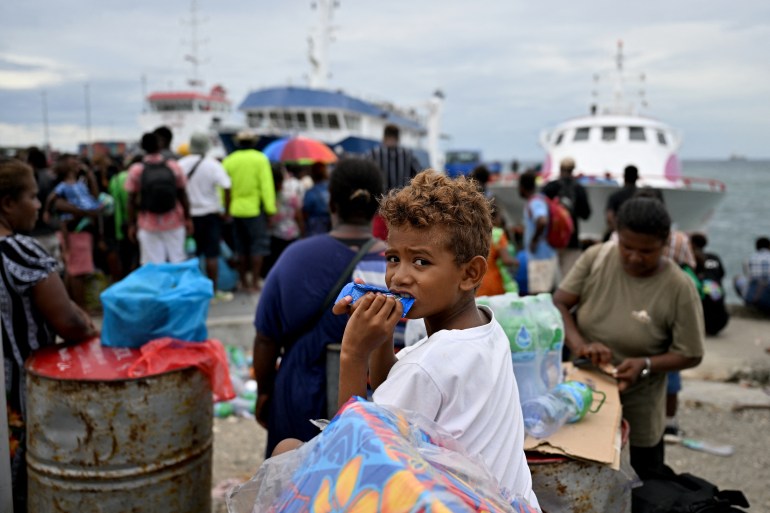The people of the Solomon Islands are set to vote for their next government on April 17, in an election that could have repercussions for the rest of the Asia Pacific region due to the country’s close relationship with China.
The Pacific state’s 760,000 citizens are spread across its 900 islands and 28,230 square kilometres (10,900 square miles) of territory, making this one of the most logistically challenging elections in the world. It will take several weeks to collect all the ballots and then wait for the country’s 50 MPs to form a government before they choose the next prime minister.
Neighbours like Australia, New Zealand and Papua New Guinea have sent police to help with security during the election period as elections in the past have been followed by periods of unrest.
The election is taking place a year later than usual so the Solomon Islands government could focus its resources on hosting the 2023 Pacific Games, a move which raised more than a few eyebrows among observers.
What’s at stake in the election?
The election has been described as “perhaps the most important to [the] Solomon Islands since independence” by Tarcisius Kabutaulaka, an associate professor and former director of the Center for Pacific Islands Studies at the University of Hawaii, because of the country’s ongoing economic problems and its role in the greater rivalry between China and the United States.
For foreign observers, the major issue is the Solomon Islands’s ongoing relationship with China and whether Prime Minister Manasseh Sogavare will be re-elected.

Sogavare is best known overseas for switching diplomatic recognition in 2019 from Taiwan to China.
The controversial decision stirred unrest and in November 2021, protesters targeted Honiara’s Chinatown and tried to storm Sogavare’s residence. Peace was restored with the help of a contingent of Australian police following a request from the government.
Then in 2022, Sogavare signed a secretive security pact with Beijing causing alarm in Australia, New Zealand and the US. The countries feared China could one day build a naval base there, dramatically increasing Beijing’s military reach. The island chain lies about 2,000km (1,200 miles) east of the Australian city of Brisbane and just more than 6,000km (3,728 miles) southeast of the Chinese city of Shanghai.
One of Sogavare’s rivals for the top job, Peter Kenilorea Jr, an outspoken MP and the son of the country’s first prime minister, has pledged to switch ties back to Taiwan.
For Solomon Islanders, however, “bread and butter” issues trump all else, according to Graeme Smith, a fellow at the Australian National University’s Department of Pacific Affairs. “I don’t think that the China thing is really that central of an issue. Normally, what people are excited about in their daily lives are health, education and transport,” he told Al Jazeera.
Although it is rich in natural resources, the Solomon Islands ranks just 155 out of 199 countries in the United Nations’s Human Development Index. Critics have also accused the government of economic mismanagement and corruption, further exacerbating these problems.
Kabutaulaka told Al Jazeera that one of the key group of issues for Solomon Islanders is the government’s ability to provide social services like health, education, and rural development – or conversely, whether they have failed to do so. Another group of concerns is whether voters think their chosen MP will be able to access and share state resources.
“It’s not so much about the China relationships or relationships with the US, it’s going to be about the ability of those elected and their willingness to assist people locally or assist their communities,” he said.

How does the election work?
Polling stations open at 7am on Wednesday, (20:00 GMT on Tuesday) and close at 4pm (05:00 GMT).
Some 6,780 election officials will be involved – twice the number of the 2019 election because voters will also be choosing new provincial assemblies and the Honiara City Council.
Voters must be citizens and at least 18 years old. Election day is a public holiday to allow those who have registered “to exercise their democratic voting right”, according to the Electoral Commission.
To show they have voted, each person dips the little finger of their left hand into a pot of ink.
The election operates under the first-past-the-post system, which means the candidate who gets the most votes is elected.
How is expected to win the election?
Sogavare is considered a frontrunner but he will be challenged by several opposition figures including Kenilorea Jr, Gordon Darcy Lilo, another former prime minister, and Matthew Wale, the leader of the opposition. Whether the opposition can work together will determine Sogavare’s future.
Politics in the Solomon Islands is dominated by individual leaders rather than political parties and this election should be no different, according to Smith. Some Solomon Islanders could be ready for a change.
“In most of the Pacific states, political parties are almost irrelevant themselves each election, it’s really just about after the election, who’s the most charismatic individual in the room that can convince the majority of MPs to follow him,” he told Al Jazeera. “When the government is eventually formed, it could end up having people from all different parties.”
How do Solomon Islanders feel about China?
Even before the Solomon Islands’s switch to Beijing in 2019, the growing number of businesses owned by ethnic Chinese was a source of controversy and targeted in riots in 2006, 2019 and 2021 due to their perceived economic and political clout.

Since formal diplomatic ties were established in 2019, China’s track record has been mixed, according to experts. Its main achievement so far has been building a $119m stadium to host the 2023 Pacific Games – great for the capital Honiara but of little concern to people in the country’s other provinces.
Honiara’s switch to Beijing has also not translated to the economic growth many Solomon Islanders might have hoped it would, according to the University of Hawaii’s Kabutaulaka. This year, the International Monetary Fund (IMF) is predicting Solomon Islands’s gross domestic product (GDP) to grow by just 2.4 percent after a disastrous pandemic when the economy contracted.
China has also shaken up local politics, according to experts.
In 2021, after China took over funding from Taiwan, payments for the first time went only to 39 of 50 MPs rather than all of them, according to news reports. The constituency funds, however, were controversial long before the diplomatic switch and remain a sticking point as potential source of corruption.
Will there be unrest?
Elections in the Solomon Islands, like many countries, can bring long-simmering issues to the surface. Sogavare’s last win in 2019 led to rioting and protests, which also targeted many Asian-run businesses, a theme that was repeated in 2021 when at least three people were killed.
Analysts note that unrest typically does not occur during the national voting period but begins to flare up as the new government is formed several weeks later. In short, if unrest happens, it will not be until sometime in late April or early May.

The chance of violence this time is small but elections can become a lightning rod for political grievances, according to Ride.
“Throughout the post-election process, there is heightened risk of social unrest, such as rioting and looting,” Ride said in a report for the Australian Strategic Policy Institute ahead of the April 17 election.
“Research across the Pacific indicates that the probability of such conflict rises amid political transition when crowds gather amid grievances about governance and foreign control and interference,” she said.

